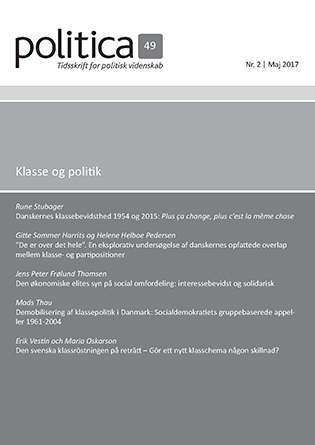”De er over det hele”. En eksplorativ undersøgelse af danskernes opfattede overlap mellem klasse- og partipositioner
DOI:
https://doi.org/10.7146/politica.v49i2.131258Resumé
Betydningen af sociale klasser i det moderne samfund er fortsat omstridt. Vælgeradfærdsforskningen har vist, at sociale klasser har svindende betydning for partivalg, men sociologiske studier viser, at sociale klasser fortsat har afgørende betydning for menneskers livsstil. En mulig årsag til den uafklarede betydning af klasser er, at folks forståelse af de sociale klasseforhold ikke passer til deres forståelse af den moderne partikonkurrence. I denne artikel gennemføres gennem fokusgruppediskussioner en eksplorativ undersøgelse af folks kobling mellem sociale klasser i det danske samfund og de politiske partier. Analysen bekræfter, at deltagerne fortsat opfatter det danske samfund som klasseopdelt, men kun meget vanskeligt kan angive, hvor partierne finder deres vælgere blandt disse klasser.
Referencer
Alford, Robert R. (1963). Party and Society. Chicago: Rand McNally.
Andersen, Johannes og Jørgen Goul Andersen (2003). Køn, alder og uddannelse, i Jørgen Goul Andersen og Ole Borre (red.), Politisk forandring. Værdipolitik og nye skillelinjer ved folketingsvalget 2001. Aarhus: Systime.
Barbour, Rosaline (2007). Doing Focus Groups. London: Sage.
Beck, Ulrich og Elisabeth Beck-Gersheim (2002). Individualization: Institutionalized Individualism and Its Social and Political Consequences. London: Sage.
Bourdieu, Pierre (1984). Distinction. A Social Critique of the Judgement of Taste. London: Routledge.
Bourdieu, Pierre (1989). Social space and symbolic power. Sociological Theory 7 (1): 14-125.
Dalton, Russel J. og Martin P. Wattenberg (2002). Parties without Partisans: Political Change in Advanced Industrial Democracies. Oxford: Oxford University Press.
Elo, Irma T. (2009). Social class differentials in health and mortality: Patterns and explanations in comparative perspective. Annual Review of Sociology 35: 553-572.
Faber, Stine T., Annick Prieur, Lennart Rosenlund og Jakob Skjøtt-Larsen (2012). Det skjulte klassesamfund. Aarhus: Aarhus University Press.
Flemmen, Magne (2013). Putting Bourdieu to work for class analysis: Reflections on some recent contributions. British Journal of Sociology 64 (2): 325-343.
Flemmen, Magne (2014). The politics of the service class. European Societies 16 (4): 543-569.
Goldthorpe, John. H. (1996). Class analysis and the reorientation of class theory: The case of persisting differentials in educational attainment. British Journal of Sociology 47: 481-505.
Green-Pedersen, Christoffer (2007). The growing importance of issue competition: The changing nature of party competition in Western Europe. Political Studies 55 (4): 607-628.
Green-Pedersen, Christoffer (2011). Partier i nye tider: Den politiske dagsorden i Danmark. Aarhus: Aarhus Universitetsforlag
Halkier, Bente (2008). Fokusgrupper, 2. udg. København: Samfundslitteratur.
Harrits, Gitte S., Annick Prieur, Jakob Skjøtt-Larsen og Lennart Rosenlund (2010). Class and politics in Denmark: Are both old and new politics structured by class? Scandinavian Political Studies 33 (1): 1-27.
Harrits, Gitte S. (2014) Klasse. En introduktion. København: Hans Reitzels Forlag.
Harrits, Gitte S. og Helene H. Pedersen (2017). Class categories and the subjective dimension of class: The case of Denmark. British Journal of Sociology, under udgivelse.
Harrits, Gitte S. og Helene H. Pedersen (i.å). Selfish upper classes and caring lower classes: The possible ineffectiveness of moral boundary drawing in egalitarian societies. I review.
Jansen, Giedo, Geoffrey Evans og Nan Dirk de Graaf (2013). Class voting and left-right party positions: A comparative study of 15 Western democracies, 1960–2005. Social Science Research 42 (2): 376-400.
Kirchheimer, Otto (1966). The transformation of the Western European party systems, i Joseph LaPalombera og Myron Weiner (red.), Political Parties and Political Development. Princeton: Princeton University Press.
Knutsen, Oddbjørn (2001). Social class, sector employment and gender as party cleavages in the Scandinavian countries: A comparative longitudinal study, 1970-1995. Scandinavian Political Studies 24 (4): 211-350.
Lipset, Seymor. M. og Stein Rokkan (1967). Cleavage structures, party systems and voter alignments: An introduction, i Seymor M. Lipset og Stein Rokkan (red.), Party Systems and Voter Alignments: Cross-national Perspectives. New York: Free Press.
Lukács, Geor (1967). Geschichte und Klassenbewusstsein. Berlin: Der Malik Verlag.
Mair, Peter (2013). Ruling the Void. The Hollowing of Western Democracy. London, New York: Verso.
Marx, Karl (1974 [1847]). Filosofiens elendighed, i Karl Marx, Skrifter i udvalg. København: Rhodos.
Rosenlund, Lennart (2000). Social structures and change: Applying Pierre Bourdieu’s approach and analytic framework. Working Paper 85. Stavanger: Stavanger University College.
Pakulski, Jan and Michael Waters (1996). The Death of Class. London: SAGE.
Savage, Mike (2000). Class Analysis and Social Transformation. Buckingham: Open University Press.
Savage, Mike, Fiona Devine, Niall Cunningham, Mark Taylor, Yoajun Li, Johannes Hjellbrekke, Brigitte Le Roux, Sam Friedman og Andrew Miles (2013). A new model of social class: findings from the BBC’s Great British Class Survey Experiment. Sociology 47 (2): 219-250.
Stubager, Rune (2009). Education-based group identity and consciousness in the authoritarian libertarian value conflict. European Journal of Political Research 48 (2): 204-233.
Thau, Mads (2017). Demobilisering af klassepolitik i Danmark: Socialdemokratiets gruppeeappeller 1961-2004. Politica 49 (2): 158-178.
Thomassen, Jacques (2005). The European Voter: A Comparative Study of Modern Democracies. Oxford: Oxford University Press.
Zinni, Frank P., Laurie A. Rhodebeck og Franco Mattei (1997). The structure and dynamics of group politics: 1964-1992. Political Behavior 19 (3):247-282.
Downloads
Publiceret
Citation/Eksport
Nummer
Sektion
Licens
LicensOphavsretten tilhører Politica. Materialet må ikke bruges eller distribueres i kommercielt øjemed.





